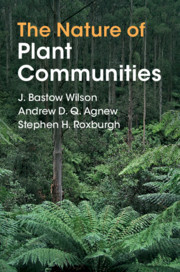The Nature of Plant Communities
Langue : Anglais
Auteurs : Wilson J. Bastow, Agnew Andrew D. Q., Roxburgh Stephen H.

Provides a comprehensive review of the role of species interactions in the process of plant community assembly.
Most people can readily identify a forest, or a grassland, or a wetland - these are the simple labels we give different plant communities. The aim of this book is to move beyond these simple descriptions to investigate the 'hidden' structure of vegetation, asking questions such as how do species in a community persist over time? What prevents the strongest species from taking over? And, are there rules that confer stability and produce repeatable patterns? Answers to these questions are fundamental to community ecology, and for the successful management of the world's varied ecosystems, many of which are currently under threat. In addition to reviewing and synthesising our current knowledge of species interactions and community assembly, this book also seeks to offer a different viewpoint - to challenge the reader, and to stimulate ecologists to think differently about plant communities and the processes that shape them.
1. Plants are strange and wondrous beings; 2. Interactions between species; 3. Mechanisms of co-existence; 4. Community-level processes; 5. Assembly rules; 6. Theories and their predictions; 7. Synthesis.
J. Bastow Wilson was a professor of Botany at the University of Otago, New Zealand. He taught ecology from 1971 until his retirement in 2013, when he was awarded the title of Emeritus Professor. He was elected a Fellow of the Royal Society of New Zealand in 1997, in recognition of his prominence and global leadership in plant ecology and vegetation science. In 1999 he joined the board of Chief Editors of the Journal of Vegetation Science (including its sister-journal, Applied Vegetation Science), and in 2000 he became the Chair of the Chief Editors until his retirement. In honour of his services to plant ecology, Wilson was made an honorary life member of the International Association for Vegetation Science in 2013. Over the course of his career Wilson made sustained, insightful and significant contributions to our understanding of how plant communities function, with his research published in over 230 scientific papers.
Andrew D. Q. Agnew, now retired, taught students plant ecology and taxonomy in Dundee, Baghdad, Nairobi and Aberystwyth University. He has a deep interest in the flora of Kenya, and has published widely on the flora and vegetation of that country. Agnew was a long-term colleague of J. Bastow Wilson, and together they published many scientific papers on vegetation dynamics and plant community ecology.
Stephen H. Roxburgh is an ecologist with the Commonwealth and Scientific Research Organisation in Canberra, Australia. He has published over 100 scientific papers and reports on a range of ecological topics including plant community structure and the maintenance of biological diversity, vegetation patterns and dynamics, and greenhouse gas and carbon accounting. He was a former Ph.D. student of J. Bastow Wilson and worked closely with him.
Andrew D. Q. Agnew, now retired, taught students plant ecology and taxonomy in Dundee, Baghdad, Nairobi and Aberystwyth University. He has a deep interest in the flora of Kenya, and has published widely on the flora and vegetation of that country. Agnew was a long-term colleague of J. Bastow Wilson, and together they published many scientific papers on vegetation dynamics and plant community ecology.
Stephen H. Roxburgh is an ecologist with the Commonwealth and Scientific Research Organisation in Canberra, Australia. He has published over 100 scientific papers and reports on a range of ecological topics including plant community structure and the maintenance of biological diversity, vegetation patterns and dynamics, and greenhouse gas and carbon accounting. He was a former Ph.D. student of J. Bastow Wilson and worked closely with him.
Date de parution : 03-2019
Ouvrage de 370 p.
17.8x25.3 cm
Thème de The Nature of Plant Communities :
© 2024 LAVOISIER S.A.S.



